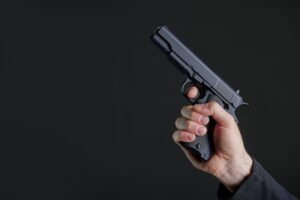
Pistol whipping—the act of striking someone with the blunt end of a handgun—is generally a crime. It can lead to serious injuries or even death, which means there are a number of offenses you could be charged with. The extent of a person’s injuries will play a role in determining which charge is appropriate.
Of course, there are defenses to this charge, just like in any other case. You may be able to avoid a conviction with the help of our Philadelphia assault defense lawyers. Instead of assuming a conviction is guaranteed, you could benefit from discussing your case with legal counsel.
What Type of Charge is Pistol Whipping?
Pistol whipping is the act of using a firearm as a blunt, improvised weapon. It usually involves striking someone with the butt of a handgun. Pistol whipping may result in any number of charges under Pennsylvania law, including:
- 18 Pa. C.S.A. § 2701: Aggravated assault, when someone purposely injures or attempts to injure someone else “with a deadly weapon”
- 18 Pa. C.S.A. § 25: This chapter includes various types of murder and homicide, including planned, unplanned, intentional, and unintentional killings
Most of these charges qualify as felonies, meaning that pistol whipping is a felony in most cases. Rarely, like if you are charged with involuntary manslaughter, you may be charged with a first-degree misdemeanor versus a felony.
What is a Deadly Weapon?
One of the challenging aspects for the prosecution is establishing that a weapon used in an assault case qualifies as deadly. The requirements for qualifying as a deadly weapon are fairly simple.
Under Pennsylvania law, an object is considered to be a deadly weapon when the use of it will likely cause death or great bodily harm. That includes “any firearm, whether loaded or unloaded.” These weapons are hard and heavy enough to cause traumatic injuries in most cases.
For a free legal consultation, call 215.515.3360
How Pennsylvania Gun Laws Affect Your Pistol Whipping Case
The presence of a firearm can greatly increase your legal jeopardy. Assault charges are serious on their own, especially when someone is injured in the process. Introducing a weapon into the situation can dramatically increase the risk of a lengthy sentence.
Philadelphia has regulations for owning or carrying a firearm. Under 18 Pa. C.S.A. § 6106, carrying a gun without a license is, in and of itself, either a third-degree felony or a first-degree misdemeanor. If you were not licensed to carry the gun you allegedly used in the pistol whipping attack, that means spending years in prison and thousands of dollars in fines—and that is before taking the attack itself into account.
Does Self-Defense Apply to Pistol Whipping?
In Pennsylvania, self-defense could be used as a viable defense if you are accused of pistol whipping someone. This is because you have the right to protect yourself from the imminent threat of harm. A threat is only imminent if you are in immediate danger of suffering an injury or being killed. If the threat is vague or unlikely to be immediate, self-defense might not be appropriate.
Even when you do face real and imminent danger, you are limited in the amount of force you can use. You must use only the amount of force necessary to protect yourself. If you respond to the threat of minor harm with deadly force, this defense will not protect you at trial.
Other Defense Strategies may be Available in Pistol Whipping Cases
Self-defense is not the only strategy that might work. The prosecution has to prove beyond a reasonable doubt that you harmed someone by pistol whipping them. This high standard can be difficult to meet, and our criminal defense attorneys might focus on the weakness of the case against you. By attacking the strength of the prosecution’s evidence, you could secure an acquittal.
Other strategies might be successful as well. If the police unlawfully searched your person or property, any evidence they collect should be excluded at trial. Our Philadelphia lawyers can review the facts and determine if the authorities ever resorted to illegal measures to build your case.
Finally, our legal team might try to get the charges reduced. For example, while voluntary manslaughter is a felony, involuntary manslaughter is a misdemeanor. If we can convince the prosecution to lower the charges in this way, the penalties you face if convicted will be much less steep.
Pistol Whipping Charges Can Upend Your Life
If you are found guilty of pistol whipping someone, it could change the shape of your life forever. In addition to jail time and fines, you might be dealing with the impact of having a felony on your record forever, which includes the loss of your job, future employment opportunities, and the negative effects on your mental health and personal relationships.
Even expungement, or the act of wiping your criminal record clean, probably cannot help you: Pennsylvania typically does not allow someone to expunge a violent crime like pistol whipping.
Fortunately, legal support is available. Hiring our criminal defense lawyer can help you better understand which specific charges you are facing and why, and what strategies we can use to fight those charges and get you your life back.
Talk to Our Attorneys About a Pistol Whipping Arrest
Pistol whipping is a crime, so if you have been accused of pistol whipping someone, the chances of a criminal prosecution are good. While a conviction can have life-altering consequences, you do have an opportunity to defend yourself. The right strategy may help you avoid a conviction and move forward with your life.
At the Law Offices of M.J. Snyder, LLC, we have a track record of success when it comes to defending the accused. If you are facing criminal charges, we look forward to the opportunity to fight on your behalf. Reach out as soon as possible for a free consultation.




